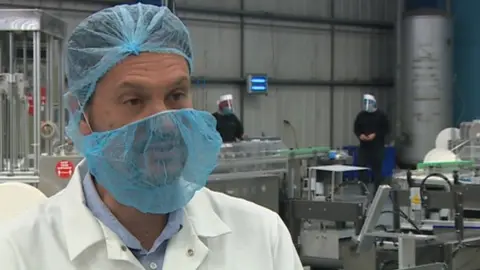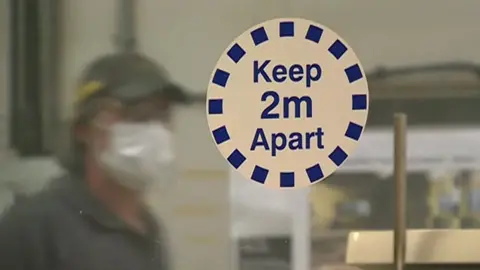Coronavirus: Welsh manufacturers expect ‘gradual’ return
There is a "desire" among companies to "get back to work", according to a business leader.
But Paul Slevin, chair of the South Wales Chamber of Commerce, said firms would still face a "challenging time" and it was "over-optimistic" to think the economy would "just bounce back".
Meanwhile, the plant director at Toyota's Deeside factory said it was "not under pressure" to hit its usual targets due to the lockdown.
Staff can build engines in 44 seconds.
But that is expected to be 10% slower since they returned to work last week and adopted new social distancing procedures.
Tim Freeman, who is also deputy managing director of Toyota Manufacturing in the UK, said: "We're engaging with organisations such as the CBI... but if there are other organisations who are interested to learn from what we're doing and maybe share their best practices with us, we'd be happy to co-operate and collaborate with them."
'Gradual' return to normality

Transcend Packaging in Ystrad Mynach, Caerphilly, manufactures sustainable packaging for the food industry with its 180 staff.
Managing director Lorenzo Angelucci said he expected the return to normality to be "gradual" with the slow reopening of fast food restaurants having an impact on the supply chain.
He agreed that sharing good practice was a "common interest" among firms, but he went on to say that the pandemic may lead to other changes.
"The supply chain has to take into consideration the risk when you put too many eggs in one basket - in particular, Asia," he said.
"Procuring or buying material only from Asia exposes yourself to a risk in the supply chain.
"The diversification of the geographical procurement will make more sense and will make more opportunities for Europe and North America."
Returning to the workplace

Mr Slevin said employers would face "fundamental issues" with staff returning to the workplace.
"If you have staff who've been on furlough, they've been economically inactive - how do you bring them back and how do you get them up to speed?" he said.
"Those who have been economically active - working from home - how do you repatriate them back to the workplace?
"I think best practices are being shared by many businesses and this is good because the larger companies maybe have some direct experience on how to do this and have the facilities to be able to do it.
"Smaller companies may be able to learn from that."

- THE R NUMBER: What it means and why it matters
- LOOK-UP TOOL: How many cases in your area?
- EXERCISE: What are the guidelines on getting out?
- RECOVERY: How long does it take to get better?
- SCHOOLS: When will children be returning?

